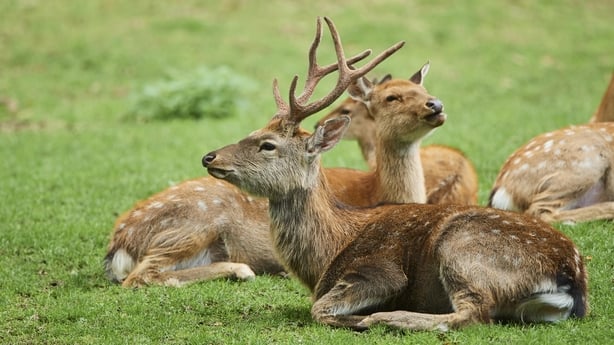A record 78,175 wild deer were culled in the 12-month period to 28 February 2023, according to data released by the National Parks and Wildlife Service (NPWS) to the Irish Deer Commission.
The figure does not include deer that were killed via road collisions or illegal poaching.
It breaks the 2022 record for the number of deer killed in a 12-month period, when 55,008 were culled.
Although the Irish Deer Commission does not know for certain why the numbers have risen so dramatically, it notes that hunting licences have increased by 45% over the past decade.
In 2023, 6,486 licences were issued.
All hunters are required to make an annual declaration to the NPWS stating the number of deer they have culled by county, sex and species.
The data shows that 71% of the cull came from seven counties - Wicklow, Cork, Waterford, Tipperary, Kerry, Galway and Clare.
Wicklow had the largest number by far, at 25,727, followed by Tipperary at 8,278.
Wicklow is also believed to have the largest deer population with estimates of around 100,000 of the animals.
However, there is no official data on the number of deer in Ireland.

The deer hunting season previously ran from 1 September to 31 December for males and from 1 November to 28 February for females.
However, earlier this year, the open season was extended for an additional month for female and young deer and for a further three months for male deer.
The Irish Deer Commission and the Irish Deer Society criticised the move at the time, arguing that extending the season for males will make hunting stags more attractive to hunters but this will not reduce the overall deer population.
In the 12-month period to 28 February 2023, 56% of the deer culled were female.
Public Relations Officer for the Irish Deer Commission Damien Hannigan said that, in previous years, around 60% of the deer culled were female, but he expects the figure to do down due to the new hunting season.
Deer have protected status under the wildlife acts.
However, they have no natural predators and populations in certain counties are recognised as being above sustainable levels.
Coordinator of the Irish Wildlife Trust Kieran Flood said that as a wildlife organisation it does not like to see any wild animals being killed but it understands the need for deer management.
"Ireland is lacking intact ecosystems with predators," Mr Flood said, explaining that the deer population has become too large and causes damage to natural habitats.
"Deer can have negative impacts on habitats in Ireland, particularly in woodlands," he explained, adding that "they can stop woodland from regenerating by eating or trampling new growth".
Mr Flood said that Ireland is in need of more nature conservation measures beyond culling deer.







